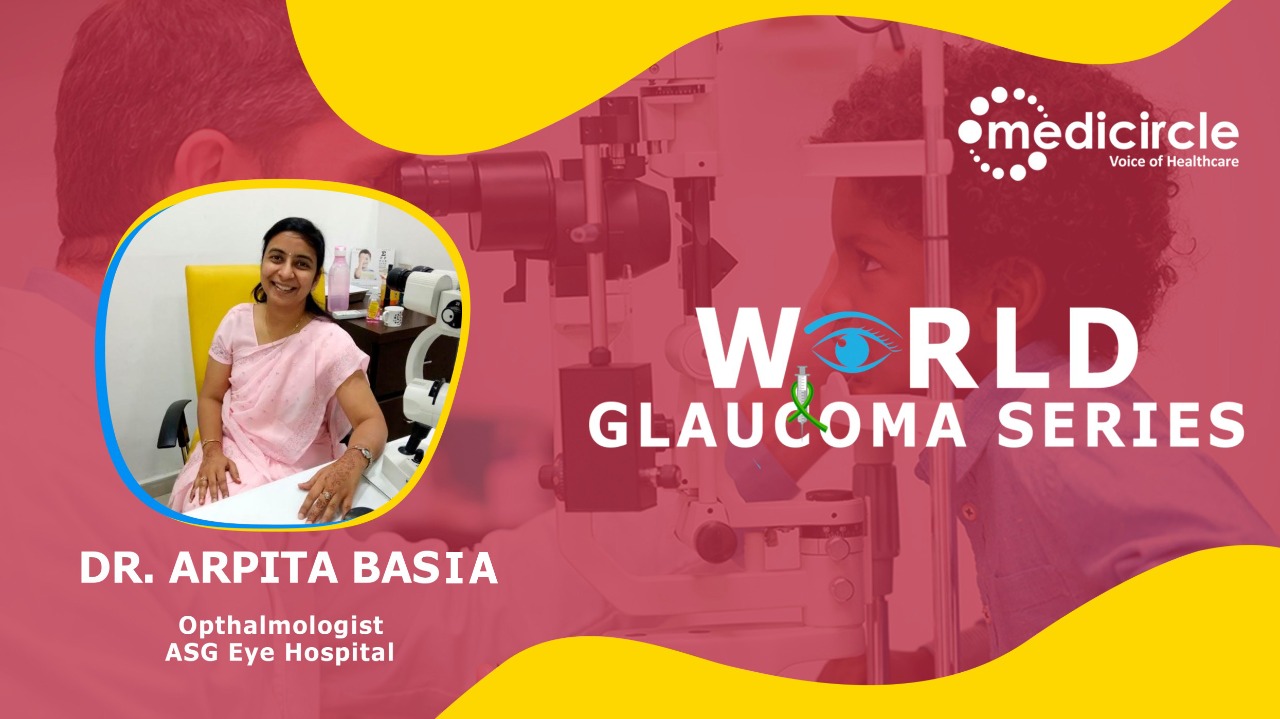Eyes help you to see the beauty around you. The thought of the loss of vision or blindness can be very scary. As age advances loss of eyesight is one of the important concerns. Protecting your eyes will help reduce the possibility of vision loss. Glaucoma is a group of eye conditions that damages the optic nerve, which is vital for good vision. It is the second leading cause of blindness. Medicircle is conducting an awareness series on glaucoma with eminent ophthalmologists to spread awareness and educate people about eye health.
Dr. Arpita Basia is an MS from regional Institute Allahabad and has a fellowship in glaucoma from LVP Eye Institute, Hyderabad. She has also worked as a Glaucoma Consultant in LVP for a year. She is presently working as a Glaucoma, Cataract and Refractive Surgeon at ASG Eye Hospital, Bhopal.
ASG Eye Hospitals was established with a mission of making available to every individual, the best of eye care solutions irrespective of their awareness, knowledge, and financial levels and for this purpose to create a pool of trained and skilled eye care professionals whose skills and knowledge levels are at par with the best in the world. ASG provides comprehensive diagnostic, medical, and surgical eye care services through the latest technology.
Glaucoma Can Cause Blindness
Dr. Arpita explains, “Glaucoma is an optic nerve disease. The main nerve in the eye is the optic nerve, which helps you see. Glaucoma affects that nerve and does cause blindness.” She further explains, “If this disease remains undiagnosed and untreated for a long time, it may cause blindness. We know that glaucoma is a very slow progressive disease. It is also a very silent disease which means that it does not give you any symptoms. The patient does not feel any itching, redness, etc. and hence he /she does not go to the doctor. If glaucoma remains undetected for a long time, there will be no treatment leading to blindness,” informs Dr. Arpita.
Glaucoma is Irreversible but Treatable
Dr. Arpita emphasizes, “The optic nerve gets damaged in glaucoma. If the damage has already occurred then it is not reversible. In Hindi, this condition is also called “Kala Pani” because people equate it to the punishment of ancient times which was never taken back. Glaucoma is also something like that. It's irreversible. The damage that has already been done in the optic nerve is not reversible but it is treatable in the sense that whatever loss has not occurred can be reversed or controlled.
Condition of Optic Nerves in Glaucoma
Dr. Arpita says, “Our optic nerves are made up of a lot of fibers. There are 1.7 million nerve fibers and these nerve fibers appear pink if they are aligned, but when glaucoma occurs the nerve fibers start appearing white or pale. By looking at the optic nerve, doctors detect the disease. There is a loss of vision. The important thing with glaucoma’s loss of vision is that the central vision remains intact but the peripheral vision gets lost. The patient can see in the center, but the peripheral vision starts disappearing. There is a tunnel-like vision. Just as it happens in a tunnel, it’s just a small portion you can see, only the central vision. People are not able to perceive vision loss at the starting phases. After a certain period when it remains untreated, then even the central vision goes away leading to permanent blindness,” says Dr. Arpita.
Prevention Tips
Dr. Arpita advises, “There are certain factors which have to be kept in mind. If the age of the patient is more than 40 years old, he should have a routine eye examination. If someone on either mother’s side or the father’s side of the family had got diagnosed with glaucoma, it is an alarming factor and routine eye check-ups should be done. If the eye has experienced any trauma in the past, regular eye check-ups are mandatory. Some people are dependent on steroids for arthritis treatment or skin allergies and are either diabetic or hypertensive, these people should have a routine eye examination. The early the disease gets diagnosed, the better the prevention rate, informs Dr. Arpita.
(Edited by Amrita Priya)

 Glaucoma does cause blindness if it remains undiagnosed and untreated, but the important thing to remember is that the blindness caused by glaucoma is very slow. If through routine examinations the disease gets detected, then treatment is possible. The earlier the stage, the better, says Dr. Arpita Basia, Glaucoma, Cataract and Refractive Surgeon.
Glaucoma does cause blindness if it remains undiagnosed and untreated, but the important thing to remember is that the blindness caused by glaucoma is very slow. If through routine examinations the disease gets detected, then treatment is possible. The earlier the stage, the better, says Dr. Arpita Basia, Glaucoma, Cataract and Refractive Surgeon.








.jpeg)


.jpg)







.jpeg)

.jpg)




.jpg)




.png)

